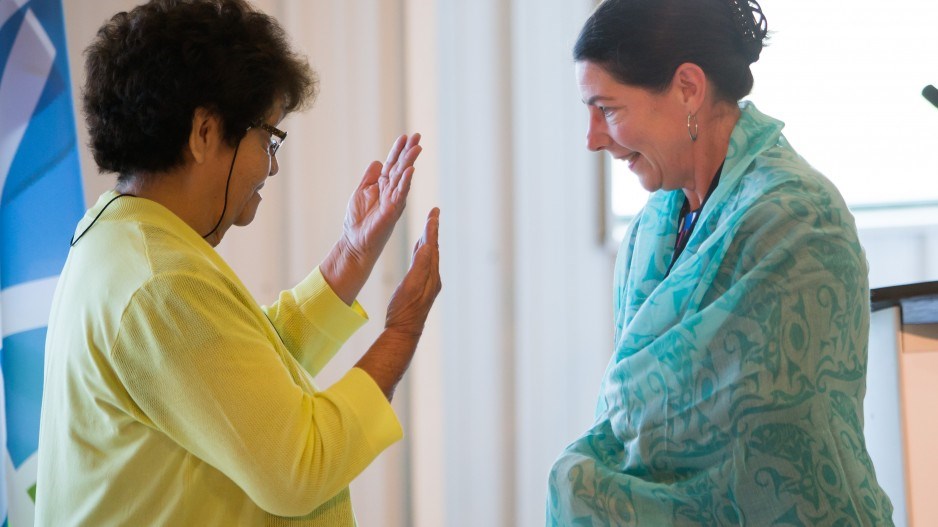The 30-year partnership that the Vancouver Airport Authority (VAA) and the Musqueam Indian Band signed in June could be a template for other organizations that operate on traditional Musqueam territory – such as the Port of Vancouver – because of the business stability that the agreement promises.
Discussion that followed the signing mostly focused on what the VAA was giving the Musqueam:
•1% of its annual revenue per year – a sum that starts at $5 million this year and is expected to total more than $200 million over 30 years, given expected revenue increases;
•10 $10,000 scholarships each year as well as guaranteed apprenticeships and jobs at Vancouver International Airport (YVR);
•more opportunities for Musqueam businesses to get contracts; and
•more Musqueam input on future VAA development projects and a new relationship manager to further foster communication.
VAA vice-president of communications Anne Murray added that the pact was the “right thing to do” partly because the VAA achieved “certainty of operations” for the next 30 years.
Musqueam councillor Wendy Grant-John was more direct about what uncertainty lay around the corner if negotiations for the agreement were to fall apart.
“Our chief said, ‘If we are not going to have negotiations, I will be out tomorrow blockading that bridge and stopping all traffic in and out,’” Grant-John told Business in Vancouver.
“[Chief Wayne Sparrow] was very clear about that. If they don’t want to talk, we’re going to blockade. That was very much a part of the seriousness of the negotiations.”
The Greater Vancouver Board of Trade’s public policy director, Rob MacKay-Dunn, speculated on Twitter that an added benefit of the partnership could be that it will make it more challenging for the federal government to privatize the airport – something federal Transport Minister Marc Garneau confirmed on a January visit to Vancouver that his government is considering.
Grant-John and those who practise aboriginal law, however, say that the agreement is unlikely to have any effect on the complexity of privatizing the airport.
“I doubt that this partnership arrangement has added any more complication to what would already be a very complicated process,” said Gall Legge Grant & Munroe LLP partner Geoff Plant, who was basing his opinion on his legal understanding and his political savvy, given that he was also B.C.’s attorney general and the minister in charge of treaty negotiations between 2001 and 2005.
“Any dealing with the airport lands, whether through privatization or otherwise, would engage significant consultation and accommodation obligations.”
The federal government has not clarified if airport privatization would entail selling the airport’s land on Sea Island or simply selling the lease that the VAA is operating under until 2072.
McMillan LLP partner Robin Junger told BIV that if the privatization were to happen without any land being sold, it could be legally (though likely not politically) possible for the federal government to not even consult the Musqueam.
He pointed to court decisions that say consultation would not be required if the business decision does not affect any of a First Nation’s claimed rights, such as a right to hunt or fish.
“If no more or less federal land is being used [under a privatization] it is not going to affect the Musqueam’s claim to title,” he said.
Grant-John said the Musqueam would not accept the federal government making a substantive change in how YVR operates without consultation even if the change does not alter the size of operations at the airport.
She added that the Musqueam have a historical claim to owning Sea Island and that the band is in ongoing self-government talks with the federal government.
Self-government talks, however, are a separate but parallel strategy to partnership agreements in the Musqueam’s attempt to enhance economic opportunity for band members.
The Musqueam’s agreement with VAA does not prevent the band from pressing its case with the federal government that it owns Sea Island.
It only stipulates that the Musqueam will not disrupt airport operations while it negotiates or litigates to prove that case.
Grant-John said that the Musqueam views its partnership with the VAA as a template for future agreements with public bodies, such as the Port of Vancouver, which also operate on traditional Musqueam territory.
That territory includes a wide swath that cuts through Vancouver, North Vancouver, Burnaby, New Westminster, Richmond and Surrey.
While few would argue that this land is not territory that the Musqueam traditionally used, the Musqueam’s claim that it is “unceded land” is more contentious because no court has ruled that the Musqueam have title to the land.
The result is that the Musqueam are either faced with spending millions of dollars and a decade or more in court to try to prove their right to title over the land, or instead opting for partnership agreements.
“The agreement with the airport is very much a part of our strategy moving forward,” she said, adding that many members of the band are more excited about the educational and job opportunities than about revenue sharing.
“We’ll also be at the table – the self-government table – with the federal government, and in those discussions will be Transport Canada. Transport Canada does have those [Port of Vancouver] lands but I’m not saying that they are at the table now.”
At press time, no one from the Port of Vancouver was available for an interview to discuss potential Musqueam negotiations. •




